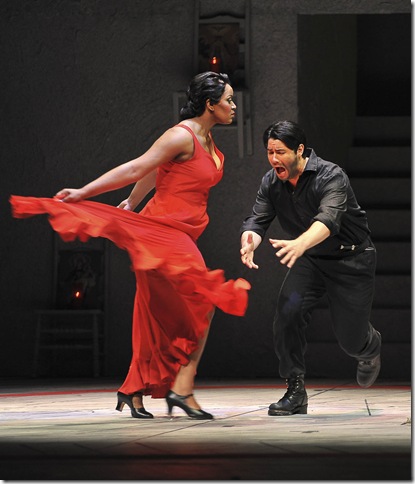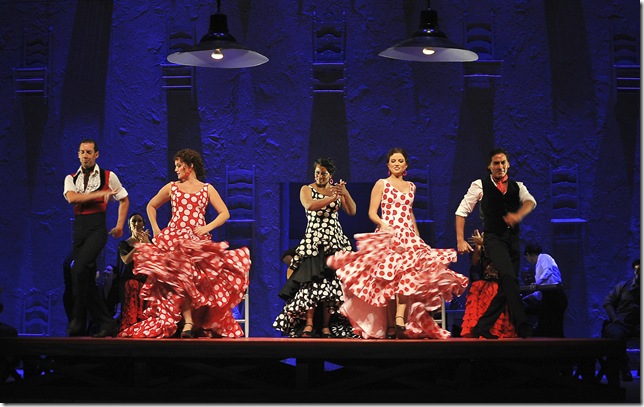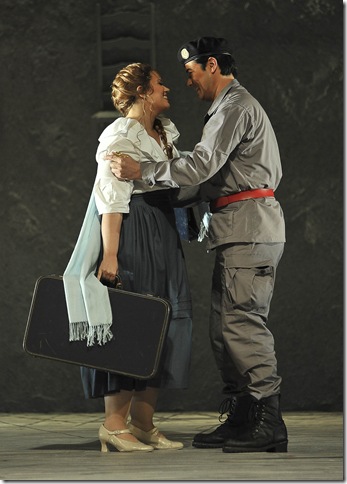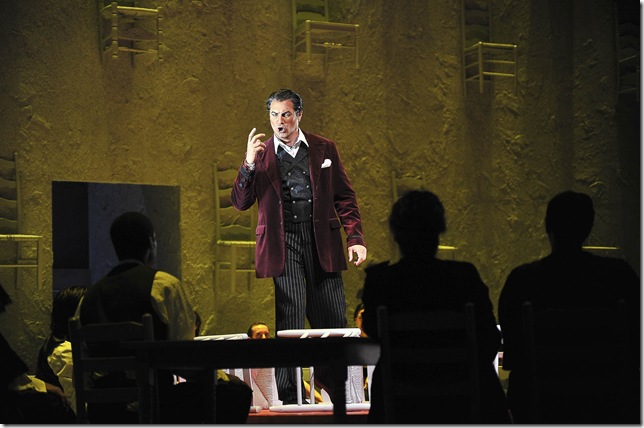The Florida Grand Opera closed its 69th season Saturday night in Fort Lauderdale with a production of Georges Bizet’s Carmen that was sometimes brilliant, sometimes risible, but that also offered reliably good singing and enough dramatic punch to give it real entertainment value.
In their bid to reinterpret this greatest of French operas, the Franco-Canadian team of André Barbe and Renaud Doucet spent time in Andalucia soaking up authentic Spanish culture, and it was those moments of the production that were most successful as departures from the norm. The two men brought in 15 flamenco dancers for this production, and they were used to excellent effect, particularly at the opening of the second act, in which the troupe danced on tabletops as the music started its slow build, and in the entr’acte to Act IV, which was accompanied by a couple’s dance lit in bright yellow.
The other major element of this Spanish Civil War-era starkly modern production, which was bereft of town square, factory, mountains and bullring in favor of a huge metallic wall with a door that served for all four acts, was chairs. The wall itself had silver-painted chairs mounted like windows, and throughout the production, cast members carried chairs wherever they went, dropping them into place for audience purposes or using them as props in dance moves.
At times, especially at the opening of Act III for the smugglers’ chorus, which had the singers moving slowly across the stage, some in near-Monty Python walking style, with chairs in hand, drew chortles and grumbles from the audience near me, and in all truth it looked pretty silly. But then there were moments when Doucet’s conception became quite clear, such as in the second act, with men and women lining up on opposite sides in rows with their chairs, slamming them down in time: Here was the essential man-woman dynamic, as filtered through the haughty color of flamenco, writ large over the whole cast, augmenting and commenting on the Carmen-Don José relationship.
Another nice piece of stagecraft came at the final confrontation between Carmen and Don José, when José poured a red-paint bullring on the ground, and Carmen, in red dress, held the sides out, bullfighter style, then dodged the charging José in quick feints. Perhaps that, too, overreached a bit, but it was interesting, and certainly the most unusual, inventive Carmen I’ve seen in some time. That it tried too hard to incorporate the chairs into everything, and that it was only partly successful dramatically, does not detract from the boldness of this production, or make it any less worth doing.
As Carmen, the St. Louis native Kendall Gladen offered a smoky, silky mezzo, very attractive in its lowest reaches and quite well-suited to this role. Her voice is not very large, but it’s a pleasure to listen to. As an actress Gladen was at her best in the more petulant aspects of her character, such as her funny mockery of the bugle call that sounds the call to duty for a reluctant José.
Tenor Adam Diegel was a very fine Don José, with a strong, cutting voice that rang out from the first notes and never let him down after that. His Flower Song was passionate and vivid, and he made the most of his climactic exclamation in that great aria – Te revoir, ô Carmen – showing us the vulnerable, ardent side of this tortured character. He acted well, too, doing nice work in a stylized knife fight with Escamillo and acting properly desperate in his final meeting with Carmen.
Soprano Elaine Alvarez, a Miami native who was making her debut with her hometown company, showed off a lovely, mature sound as Micaëla, and an instrument with enough power to carry her aloft on the Gounod-style upper reaches of much of her character’s music. This is a voice whose bigness is evident even though it sounded somewhat tired at times Saturday night.
As Escamillo, the baritone Mark Walters sang capably and well, in a very French, tightly controlled style. He played the character with the dignity of a prominent, successful man, no doubt aided by the Fernando Lamas-like smoking jacket in which he first appears at Lillias Pastia’s tavern in Act II.
Soprano Julia Ebner, as Frasquita, and mezzo Amanda Crider, as Mercédès, were effective as Carmen’s comrades in arms; Ebner has the bigger sound, but she and Crider blended well vocally, and they were effective on stage. Bass Benjamin Clements was a capable Zuniga, as was baritone Graham Fandrei as Morales and Jonathan G. Michie as Dancairo.
FGO’s orchestra was quite fine, with strong playing from the ensemble and solo instruments, particularly flute and horn. Willie Anthony Waters led them masterfully, and showed his long experience as a theater conductor in getting things back on track during at least one tricky moment at the end of Les tringles des sistres tintaient when the extra percussion of dancers’ feet and hand clapping threatened to throw everyone off.
The authentic Spanish costumes in Act IV of the bandilleros and picadors added an extra dose of strong regional flavor, and Gordon W. Olson’s lighting was smart and apt, particularly in how he was able to make a bonfire appear to flicker in a pile of chairs by using ribbons of orange light.
This production played Acts II and III without a break, which was hard for some of the audience to handle, and tougher than the more usually encountered staging of an unbroken Acts III and IV. One wonders why it is so rarely staged as it originally was, with four separate acts and three intermissions; each act is different enough for the opera to work just fine without having to keep everyone in their seats through two of them.
Barbe and Doucet will return to FGO next January for a production of Offenbach’s Tales of Hoffmann, a story that offers all kinds of room for this team’s imaginative arsenal to make an impact. Both FGO and the Palm Beach Opera have staged radically different productions of popular operas this year, which says promising things about the willingness of local audiences to accept a more European approach of directorial conceptions for well-known works quite at odds with decades, even centuries of tradition.
Florida Grand Opera will open its 70th season Nov. 13-Dec. 4 with Giacomo Puccini’s Turandot, his last and most spectacular opera. Jacques Offenbach’s final work, Tales of Hoffmann (like Turandot, unfinished at its composer’s death) follows Jan. 22-Feb. 12 and from April 16-May 14, Mozart’s Don Giovanni, in a production originally mounted for the Washington Opera. The fourth opera in the season is new, American composer David DiChiera’s Cyrano, a retelling of the Edmond Rostand play starring Leah Partridge and Marian Pop, who originated the roles for this opera at its Detroit premiere in 2007. Cyrano will be mounted only at the Ziff Ballet Opera House in Miami from April 23-May 7. For more information, call 800-741-1010 or visit www.fgo.org.



